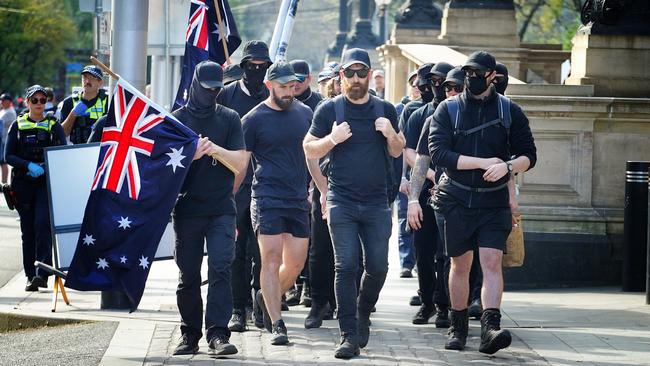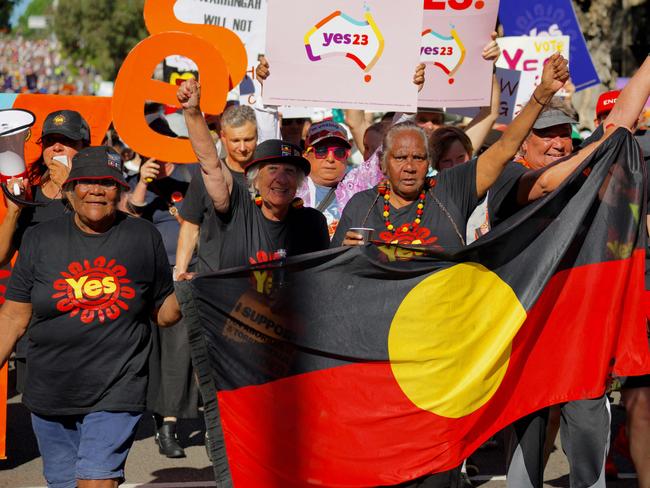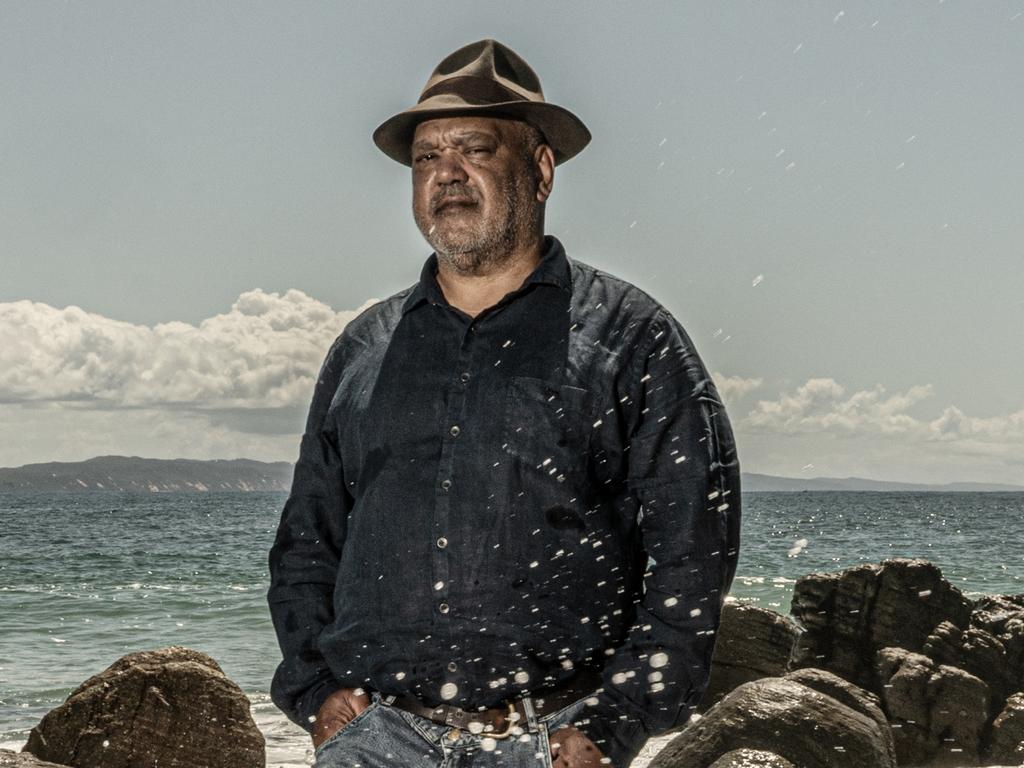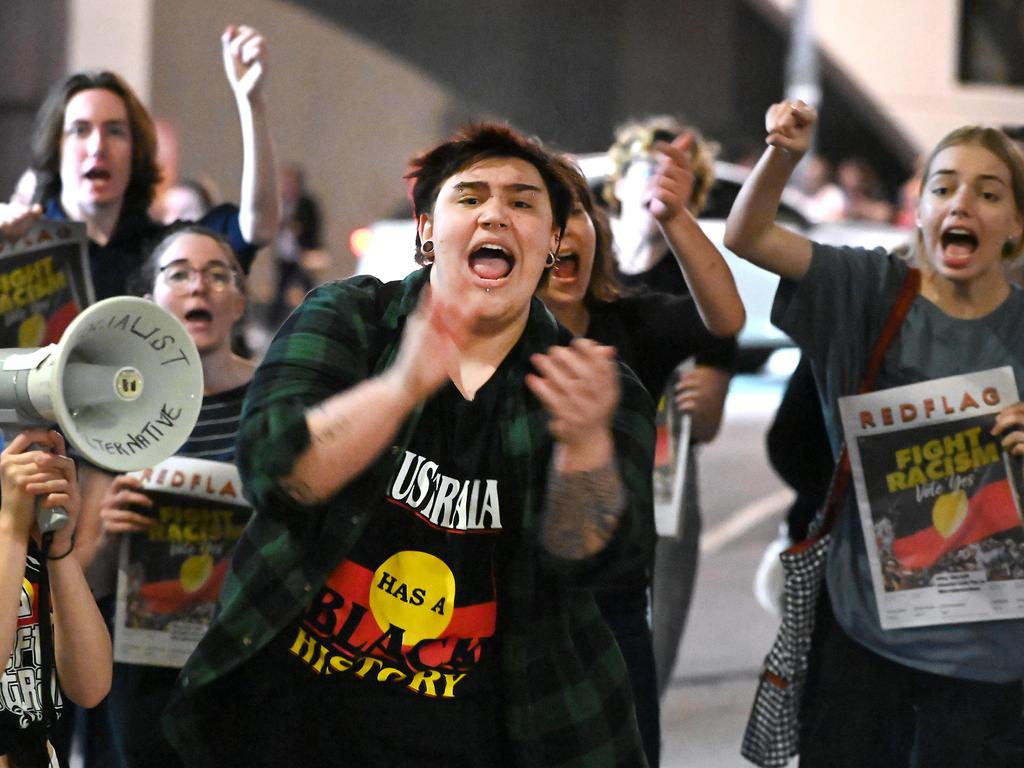Indigenous voice to parliament: Claims that we’re divided by race inflame resentment
While I deplore the toxic nature of this debate and the abuse flying in all directions, the No campaign alone has sought to make mileage from it.

They have used the extreme elements spitting bile at No rallies to smear the broader Yes campaign, just as they have used radical comments by Yes campaigners in the past to mount scare campaigns about the future.
Given the nature of partisan politics, hardline tactics from both sides were probably inevitable the moment Peter Dutton decided the Liberals would take a party position against the voice.
More surprising is how the ugly elements of the No campaign have not received as much attention. If it is fair game to smear the Yes campaign with the actions of fringe protesters, then why has there been so little attention paid to neo-Nazis turning up at a No rally in Melbourne?
While I deplore the toxic nature of this debate and the abuse flying in all directions, the No campaign alone has sought to make mileage from it. They have feigned outrage at every slight (even the term “Chicken Littles”, for crying out loud), made tricky edits of videos to pretend leading Yes campaigners have been divisive, and used it all to claim the voice would tear us apart.
The only complaint about abuse I have seen from the Yes side was the “hot mic” moment when Indigenous Australians Minister Linda Burney shared her personal anguish with NSW Premier Chris Minns. Yet I know the Yes campaigners have been attacked, and sadly, as invariably is the case in these matters, it is Indigenous people who received the most hate.
In this context I found it difficult to stomach a leading figure in the No campaign making political mileage out of receiving personal abuse when my phone hosts abusive messages from that same person. “I’m going to f..k you Noel cock suckers,” reads one text. “What Noel’s got nude photos f..king a dog? Of you f..king a dog?”
This was something to be shrugged off as an unfortunate part of public debate, until the person who sent those messages tried to take the high moral ground.
In response, I feel obliged to make his messages public. Aside from pointing to individual hypocrisy, they demonstrate how neither side of this debate can out-claim the other for moral superiority or victimhood.
I could quote hundreds of instances of email and social media abuse attacking me for supporting the voice. The visceral hatred is astonishing, and it is accompanied by accusations of idiocy, being on the take or even being part of a Machiavellian plot to provide cover for a broader News Corp line against the voice.
Both sides of this debate dish it out. But none of this bile should be used to advance the cause of one side or the other. The referendum should be decided on the issues and the arguments – social, legal, and political.
Given all sides agree on the need for Indigenous recognition in the Constitution and a form of grassroots Indigenous advice to government, there are only two questions that matter, and too often they have been ignored in a firestorm of toxicity and distraction. The central questions are whether the voice is constitutionally risky and whether it divides the nation on race – all the rest is a sideshow.
The constitutional risk has been dealt with by a range of practising lawyers, constitutional law professors and retired judges, including former chief justices of the High Court. The overwhelming majority of the legal opinions describe the proposed wording as safe, providing for a non-binding advisory body without unacceptable risk of unintended consequences.
Obviously there are dissenters and alternative points of view. And obviously, as with any legislation, especially under a new constitutional power, we can expect some aspects to be tested in court at some time.
But not even any of the dissenters are predicting dire consequences – the worst they suggest is a wide-ranging remit and the potential for administrative delay. This is because it is beyond dispute that the voice is advisory only – the term “may make representations” makes that clear.
One of the most dishonest lines pushed by No campaigners, then, is that the voice is more than advisory. They allege a sinister plot by noting the words advice or advisory do not appear in the question or the proposed constitutional chapter. Yet they know full well the non-binding nature of “may make representations” and that the phrase was chosen to place the least obligation on government given that under our Constitution “advice” is often something the crown is obliged to act on.
Still, this has always been a necessary debate because constitutional risk is a vital element for voters to weigh. It has been covered diligently in this newspaper (not so much elsewhere) and in my view, despite the attempts of some learned voice opponents, the risks have not been made out, remotely, to outweigh the potential benefits.
This leaves us with the central and most divisive claim made by the No campaign: that a voice will divide the nation on race.
I wince every time I hear this catchcry for two reasons: first, because the notion of race bristles – there is one race, the human race; and second, the voice represents a genuine effort to bring people together, not to divide but to reconcile the people of this nation and to close the gap on disadvantage.
Indigenous people are not a different race to non-Indigenous Australians, they have a different ethnic and cultural background, most often mixed with other groups that have long populated our continent such as British, Irish, Chinese, Japanese, Afghan and more. The idea of seeing a race divide in this country seems anathema but I guess it depends on personal perspective – while I am aware of different ethnic and cultural backgrounds, I have to say it never occurs to me to think of people as a different race. My wife, for instance, has Indian and European heritage – is she a different race to me? Of course not.

This is the reason I would have preferred a different constitutional amendment. We could have struck out the race references in our Constitution and replaced them with a chapter about Indigenous Australians – instead, the race power remains, the voice actually hangs from that power, and while people like me can argue about race being an ugly, old-fashioned concept, our Constitution, technically, relies on this distinction.
Importantly also, the voice does not insinuate any real or imagined racial characteristics; it is not dependent on repugnant views of skin colour or social worth as we have seen in apartheid South Africa or segregation laws in the US. Rather, the voice recognises Indigenous people on the basis that they are descendants of the original occupiers of this land.
That is all. And it is not new to suggest this confers a special place, even rights. The Mabo decision and native title laws reflect this as a legal reality, an inheritance, and it is made real in cultural heritage laws too.
These are unique connections and inherited rights that will exist forever, which is why a voice needs to be permanent – not because disadvantage will be permanent. Yes, a voice should be useful in helping to close the gap but that is not its sole reason for existence.
The voice is there to recognise and to provide input on matters such as native title and cultural heritage, and it should be able to make useful contributions about how to improve our nation.
This is not a threat but an obvious opportunity – we are not poorer for welcomes to country but richer; we are not poorer for knowing about the original inhabitants of our local area but richer; we are not poorer for the ubiquitous Aboriginal placenames in our landscape or words in our language but richer.
And we know that as a cohort Indigenous Australians are our most disadvantaged. Not all Indigenous people, obviously – there are very many success stories – but the statistics about the gap, especially on life expectancy, education and incarceration rates are heartbreaking and shameful.
This is why the federal government sought and received the right to make policy and legislate in Indigenous affairs through the 1967 referendum.
This is why we have state and federal departments of Indigenous affairs and ministers for Indigenous Australians.
If this is a racial divide it exists in government and policymaking every day. Leading No advocate senator Jacinta Nampijinpa Price holds the formal position of opposition Indigenous Australians spokeswoman – is that not divisive on the same grounds?
The argument that the voice would divide the country on race is using the perfect as the enemy of the good. It pretends away the raft of distinctions made under current law and policy, conveys the falsehood that we are already reconciled, embeds the redundant and divisive notion of race, and becomes a self-fulfilling prophecy. This is cynical politics. By claiming division based on race, the No camp inflames racial resentment.
Let me share one example of how the No campaign has been deceptively divisive. No campaigners have used selectively edited clips from Noel Pearson speaking at the National Press Club last week to claim he was being racially divisive, and the campaign group Fair Australia has done the same in an online post.
“Voice architect Noel Pearson is trying to divide us,” it says, juxtaposing him against Price, who is “uniting” us. It runs this edited clip of Pearson: “I say to multicultural communities in the campaign that I’m involved in around the country, I say to them listen, where do you fit in to Australia? It’s a bit unclear, are you kind of honorary settlers? Because some of you are the wrong colour.”
It is a harsh advertisement with ugly implications. But it is false advertising.
Here is a longer unedited transcript of what Pearson said, and he was making the opposite point, talking about the three great strands of this nation he has outlined for years – Indigenous heritage, British settlement and multicultural bounty: “I say to multicultural communities in the campaign that I’m involved in around the country, listen, where do you fit into Australia? It’s a bit unclear. Are you with the mob from the UK, are you kind of honorary settlers? Because some of you are the wrong colour, or you don’t come from northern Europe, you come from Africa, you come from Asia, you come from South America, you come from all over the joint, you come from China. I say to them, where do you fit in Australia?
“Because we can move to an Australia where the Indigenous, the British descendants and the multicultural mob become one. And we all know we’re Australians. There’s no priority among us. We’re all equally Australians. And the settler native thing kind of retreats into history. It’ll be a great day when we do that, a great day for multicultural communities too, because they’ll know unequivocally that they are Australians as much as the rest of us, as much as the whitefellas from the United Kingdom and as much as the blackfellas from Australia, the multicultural communities are Australians.”
To clip that up and call it divisive is a travesty. Not just against Pearson but also against the important choice before us, and against our country.








For political conservatives, leading No campaigners sure have perfected the leftist art of claiming victimhood. They have used every terse word and feral protester as living proof that they are being bullied and abused.